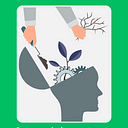Member-only story
Can Spermidine Help Prevent Memory Loss?
Studies show how this natural compound helps the brain detoxify itself
Considering that spermidine was first discovered in 1678, in a sample of human semen, it’s remarkable that it has only recently become a supplement of interest.
I must admit to having given spermidine little attention until recently. It doesn’t sound like the sort of thing that is likely to extend lives and stave off dementia, but now that I’ve overcome my conscious bias, and done some research, I must agree it’s looking promising.
Spermidine is a polyamine, a natural compound of two or more amine groups, found in a wide array of foods and in living organisms. It’s also made in the digestive tract by gut bacteria, and like all good things, levels decline with age.
Present in every cell of the body, spermidine is involved in cell growth and proliferation, tissue regeneration, DNA function and enzyme modulation. But its main superpower lies in its ability to prevent memory loss by triggering the process of autophagy.
Autophagy, meaning “self-eating” in Greek, is a process that takes place in all mammalian cells and tissues. It’s a form of clutter clearing, whereby the cell destroys its own worn out or damaged components.

